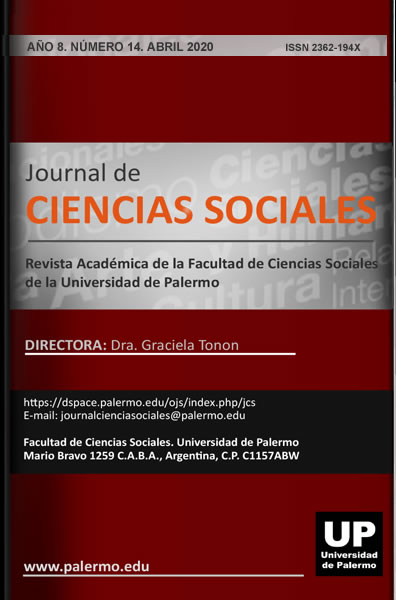Castes: Identities that cross borders
Abstract
The following essay aims at shedding light on different ways to conceive caste in India, specifically caste-based discrimination. In order to do so it questions notions on caste as a system and on the way that caste performs in nowadays world. The existence of just a single caste system dating from vedic times, the notion of a unique phenomenon from India and the perception of caste as a fixed identity are some of the frontiers that this essay will try to cross. The homologation between racial discrimination and caste-based discrimination will be one of the core debates developed in this essay pointing out two opposite view on the matter. Far from being merely theoretical questions, it will be seen how the definition adopted on the nature of caste-based discrimination could be used as a basis to forge public policies from international organizations towards India and other South Asian countries, such as in the territory of the United Kingdom, referring to the Indian diaspora. The actions of international organizations, such as the International Dalit Solidarity Network, and WCAR will be key actors and instances in such disputes, presenting different strategies to combat this type of discrimination not only in India but across its borders.
Downloads
References
Banerjee, I. (2008). ¿Existe un sistema de castas? Estudios de Asia y África, XLIII, 2, 325-382.
Chahal, C. (2008). The Evil of Caste: The Caste system as the largest systemic violation of Human’s Rights in Todays World [Reporte de la FABO, The Federation of Ambedkarite and Buddhist Organizations UK[. Recuperado de http://ambedkar.nspire.in/The%20Evil%20of%20Caste%20by%20Chanan%20Chahal.html
Chatterjee P (2008). La nación en tiempo heterogéneo, y otros estudios subalternos. Buenos Aires: Siglo XXI Editores.
Devalle, S (2002). Compiladora y Autora. Identidad y Etnicidad: continuidad y cambio. México DF: El Colegio de México- Centro de estudios de Asia y África.
Foucault, M (1996). Genealogía del Racismo. Buenos Aires: Editorial Altamira.
Fraisse, G. (2011). Del Consentimiento. Santiago: Editorial Palinodia.
Ganguly, D. (2005). Caste, colonialism and counter-modernity: Notes on a poscolonial hermeneutics of caste. New York: Routhledge.
Gupta, D. (Ed.) (2004). Caste in question: identity or hierarchy?. New Delhi: Sage.
Gupta, D. (2005). Caste and politics: identity over system. Annual Review of Anthropology, 21, 409-427.
Ibarra, N.L. y Navarro, L. (2013). Ser Dalit: identidades políticas, sistema de castas y racismo, en la India actual. VII Jornadas de Jóvenes Investigadores. Instituto de Investigaciones Gino Germani, Facultad de Ciencias Sociales, Universidad de Buenos Aires, Buenos Aires. Recuperado en: https://www.aacademica.org/000-076/17.pdf
Khilnani, S. (2004). The idea of India. London: Penguin Books.
Pinto, A. (2001). UN Conference against Racism: Is caste race? Economic and Political W eekly, 36(30), 2817-2820.
Visvanathan, S. (2001). The Race for Caste: Prolegomena to the Durban Conference. Economic and Political Weekly, 36 (27), 2512-2516.
Documentos consultados
Diarios y revistas
Beteille, A (2001, 10 de marzo). Race and caste. The Hindu. Recuperado de http://hindu.com/2001/03/10/stories/05102523.htm
Gupta, D. (2001, 19 de agosto). Caste is not Race: But, Let's Go to the UN Forum Anyway. The Times of India. Recuperado de http://timesofindia.indiatimes.com/edit-page/Caste-is-not-RacebrBut-Lets-Go-to-the-UN-Forum-Anyway/articleshow/1229264687.cms
Kaur, N. (2001,6 de julio). Caste and race. Frontline. India´s National Magazine. Arcives- Book Info18 (13). Recuperado de http://www.frontline.in/static/html/fl1813/18130950.htm
Ramanathan, V. (2001, 25 de septiembre). Caste, race and Durban Conference. The Hindu. Recuperado de http://www.hindu.com/2001/09/25/stories/13250541.htm
Otros
Constitution of India. Recuperado de https://www.india.gov.in/sites/upload_files/npi/files/coi_part_full.pdf
Douglas, P (2014). The Equality Act 2010: caste discrimination. Recuperado de https://commonslibrary.parliament.uk/research-briefings/sn06862/
International Dalit Solidarity Network. (2007, 23 y 26 de febrero). Statements and Reflections on CERD'S Review of India's periodic report, Ginebra. Recuperado de http://idsn.org/fileadmin/user_folder/pdf/Old_files/un/pdf/Responses_CERD_India.pdf
Macwan, M. (2001). (Un)Touchable in Durban. Recuperado de http://www.india-seminar.com/2001/508/508%20martin%20macwan.htm
Oommen, T. K et al (2001). Durban Conference must discuss Caste issue. Recuperado de http://www.ambedkar.org/News/Durbanconference.htm
Protection of Civil Rights (PRC) Act, 1955. Recuperado de https://indiacode.nic.in/handle/123456789/1544?view_type=search&sam_handle=123456789/1362
Report of the World Conference against Racism, Racial Discrimination, Xenophobia and Related Intolerance (2001). Recuperado de https://www.oas.org/dil/afrodescendants_Durban_Declaration.pdf
The Government of India (Scheduled Castes) Order. 1936
The Scheduled Castes and the Scheduled Tribes (Prevention of Atrocities) Act, 1989. Recuperado de https://indiacode.nic.in/handle/123456789/1920?view_type=search&sam_handle=123456789/1362
The authors retain the rights to their work guaranteeing this journal the right of first publication, committing to cite the Journal of Social Sciences as a reference of the original publication.
The works published in the Journal are published under the terms indicated in the Creative Commons License with the International Attribution 4.0 (CC BY 4.0).




























